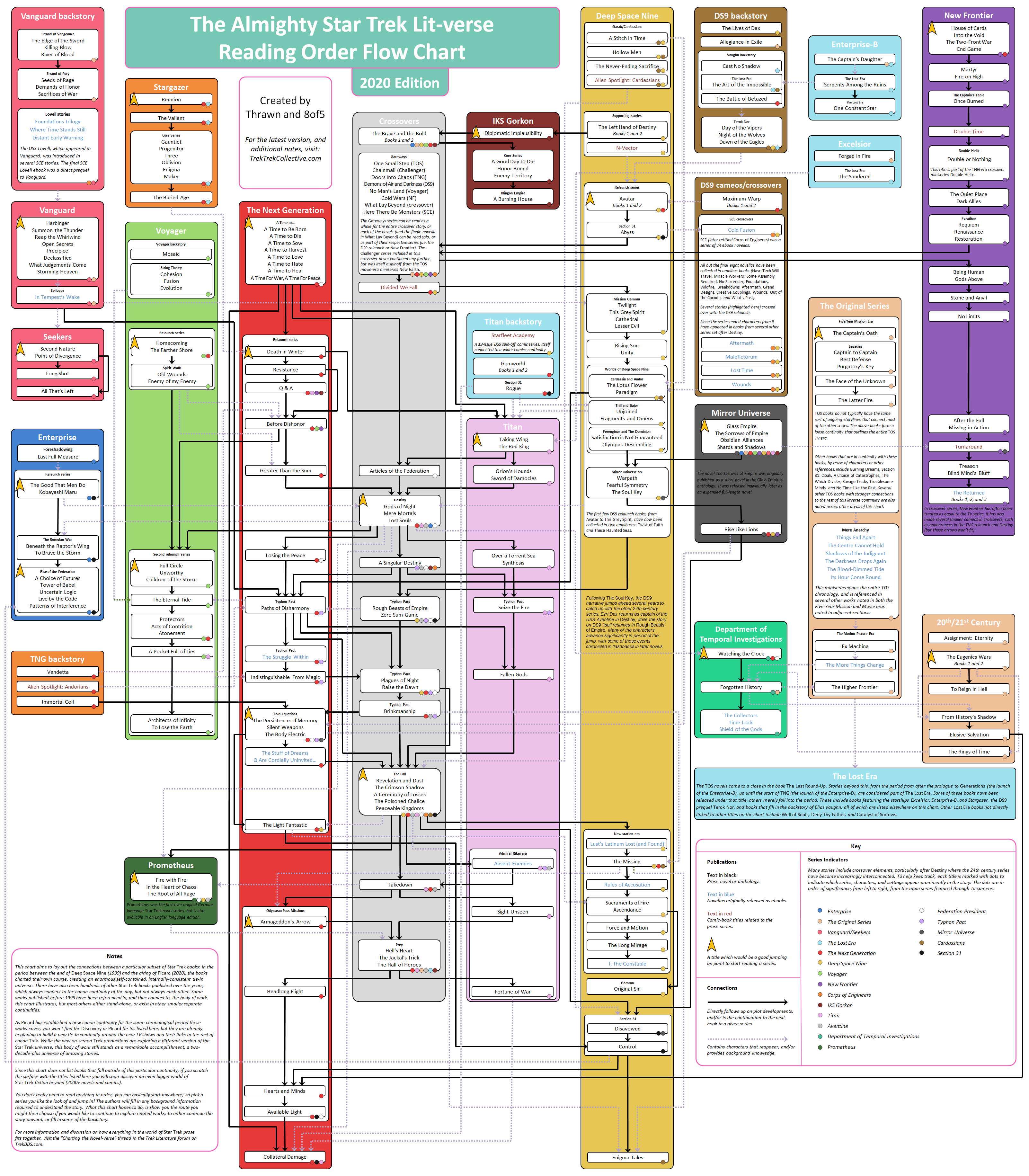In addition to the STLV group guide, Inhave found the flowchart created and maintained by the Trek Collective super helpful.
Here’s a screenshot of the current version to give you a sense of it. Suggest bookmarking the link embedded above.

In addition to the STLV group guide, Inhave found the flowchart created and maintained by the Trek Collective super helpful.
Here’s a screenshot of the current version to give you a sense of it. Suggest bookmarking the link embedded above.

The Fall ‘event sequence’ crossover is quite late in the Relaunch novelverse. It pays off some storylines that had been building for quite awhile.
I didn’t jump in that late, but still found it better to jump quite a ways back to where the Relaunch took off between the later TNG movies Insurrection and Nemesis.
One doesn’t have to read everything, as there are definitely some core books and ‘event sequences.’
Most Relaunch fans consider the two David Mack books in the TNG ‘A Time to …’ series (A Time to Kill & A Time to Heal) as key foundations, then Keith DeCandido’s ‘Articles of the Federation’ set after Riker takes command of Titan in ‘Taking Wing.’
Mack’s Destiny trilogy is fantastic and is the pivot point of the Relaunch novels. DeCandido’s ‘A Singular Destiny’ then bridges to set up the Typhon Pact sequence.
Who better to be a foil for a Vulcan trying to button down and gain the respect of Vulcan Exploratory leadership than a bunch of Betazoids who know what T’Lyn’s feeling and have no patience with her attempts to cover up with logic?
@gaghyogi49@tenforward.social has this covered.
See his post.
It looks like the Orion alphabet and language has a one-to-one correlation with English, just for laughs.
“Weird is our business,” sayeth Janeway.
I would love to see the Breen taken on seriously, and had hoped they were the big bad in Picard S3. This doesn’t have the feel of them at all though.
Perhaps Matalas can take a lead out of the Relaunch novelverse Typhon Pact books and give us some serious Breen machinations.
Thanks as always.
This episode will take a few watches to catch all the jam-packed Orion details.
Oh, I completely misunderstood the promotional copy for the comic then. It sounded like the EP for the animated videos was the lead for the comics.
In that case, I will give the preview a view. IDW has delivered some good comedic Trek content.
The videos have made me completely disinterested in even looking at the preview first issue comic.
I don’t want to reward the behaviour in any way. One viewing per very short Trek is all they will get from me.
Paramount can gauge the success from how much repeated viewing these the narrow slice of the mostly American male population of an age to have loved 90s humour. Maybe they think it’s got high overlap with Berman-era fans. I’m dubious but data will tell the story.
I hesitated to watch this one.
The humour is very 90s colonic irrigation level and sensibility.
This one did make me smile at one point though.
To see Riker, who would bravely take on fresh gagh to show openness to other cultural expectations, find the limit of his tolerances, is amusing.
I just wish the humour got beyond school age.
I really appreciate how Goldsman and Myers have taken a sibling who was only ever seen or referred to in TOS in order to drive James’ T’s anger, and turned him into a three dimensional character that we value in his own right.
Credit also to Dan Jeanotte for a consistently great and subtle performance.